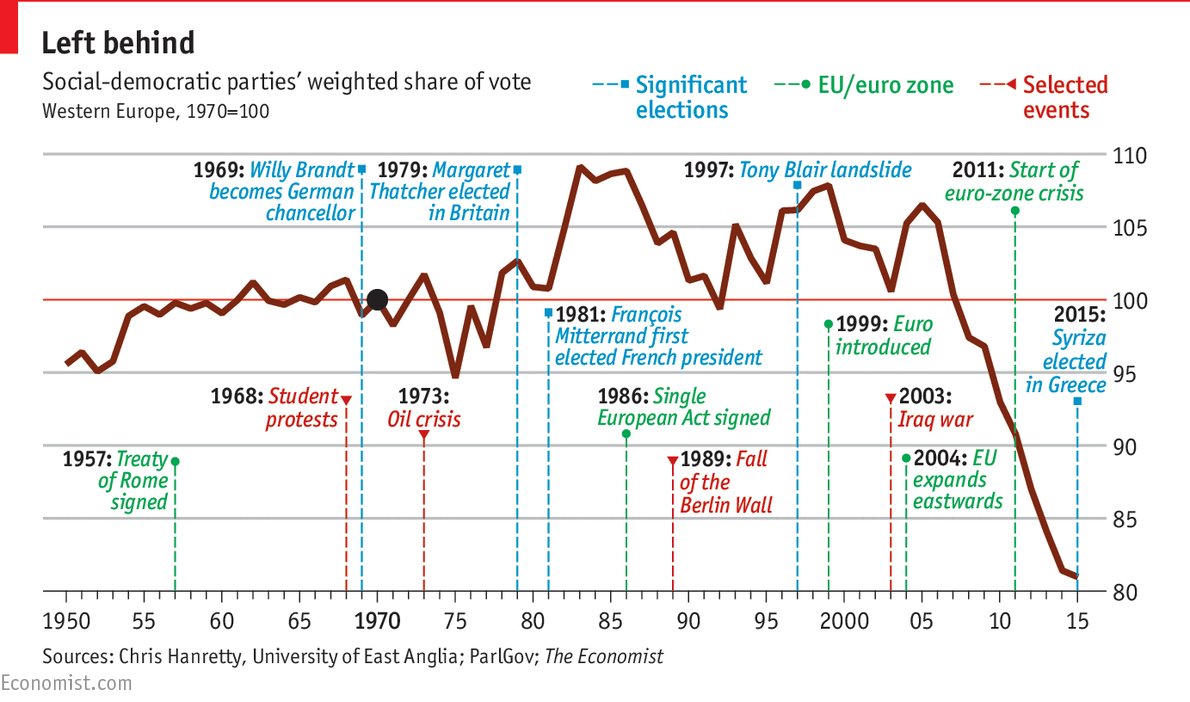A wider context to Labour’s defeat, the map below shows the weighted share of the vote for Western European social democratic parties since 1950. Looks like the dramatic decline of the share of votes for social democratic parties started with the financial crisis of 2008.
The generalised decline of European social democratic parties seems to be overdetermined, it doesn’t seem to have one prime driver. Here are a few ideas about some of the things that may be driving that decline.
The decomposition of the working class. It was the spread of large-scale Fordist industrial production that created the conditions for the development of national cohesive working classes with their own culture, civil society and ultimately political parties. Post Fordist capitalism in Europe means that what Fordist production remains is part of complex transnational value and production chains which shreds national solidarity, and the bulk of employment has shifted to a service sector marked by dispersed, non-unionised and often transient employment which cannot sustain the development of the structures of solidarity that were the foundation of social democracy.
There is a brilliant book about all this called “Germany’s Hidden Crisis: Social Decline in the Heart of Europe” by Oliver Nachtwey that looks at how the German social model (and along with social democracy) has been eroded especially after the HARTZ 4 reforms which were introduced by an SPD government. Time and again social democratic parties have been the implementers of labour market ‘reforms’ that have actually undermined the very foundations of the social solidarity that their parties were built on.
The Single Currency. Under the single currency system standard social democratic demand management and deficit financing of both full employment and social programs is effectively outlawed by treaty. This has closed down the space for social democracy, and some of the most active supporters of the EU and Euro those parties have been strongly associated and implicated in the single currency austerity programs.
The decline of the nation as an arena for political/economic action. The social democratic Left embraced the inevitability of the decline of the power of national economic policy (mistakenly in my view) and embraced transnational projects such as the EU. They failed to realise that all of social democracy was founded upon national solidarity. So far it has proved impossible to build any real transnational solidarity (which would be evidenced by substantive cross border financing of social programs) and so in the EU the space for social democracy has been reduced whilst nationalist populism has been fuelled.
The spread of identity politics on the Left. Generally social democratic parties have seen a really significant shift of membership from the industrial working class to the urban, educated, liberal white collar workers. This new membership are much more focussed on horizontal identity based solidarities compared to the predominantly vertical class based solidarities of the past. There has also been the spread of distaste for the culture of the old post Fordist unskilled working classes and the poor who are seen as reservoirs of socially conservative and reactionary culture that needs re-education. All this has contributed to large sections of the electorate drifting away from the social democratic parties.
The rise of the Greens. As the social democrats have declined so the Greens have risen. The two things are connected. Social democracy was founded upon social solidarity, almost invariably expressed in practice via the national community, its philosophy was founded upon progressive humanism and focussed on issues of human welfare. Green ideology focusses on solidarity with the non-human realm of nature and general solidarity is expressed at an abstract planetary level. Green ideology attracts support from the educated workers of the knowledge economy, where it supplies a sense of moral righteousness (which in what are essentially secular societies is a big part of any political ideology), undermining electoral support for social democratic parties. As Green ideology has leached into the Left and the social democratic policy offering so it has contributed to actively driving away parts of the post Fordist remnants of the industrial working class who are far less concerned about green issues.
I am sure there is lots more to all this – anyone else got any ideas? Leave a comment.

